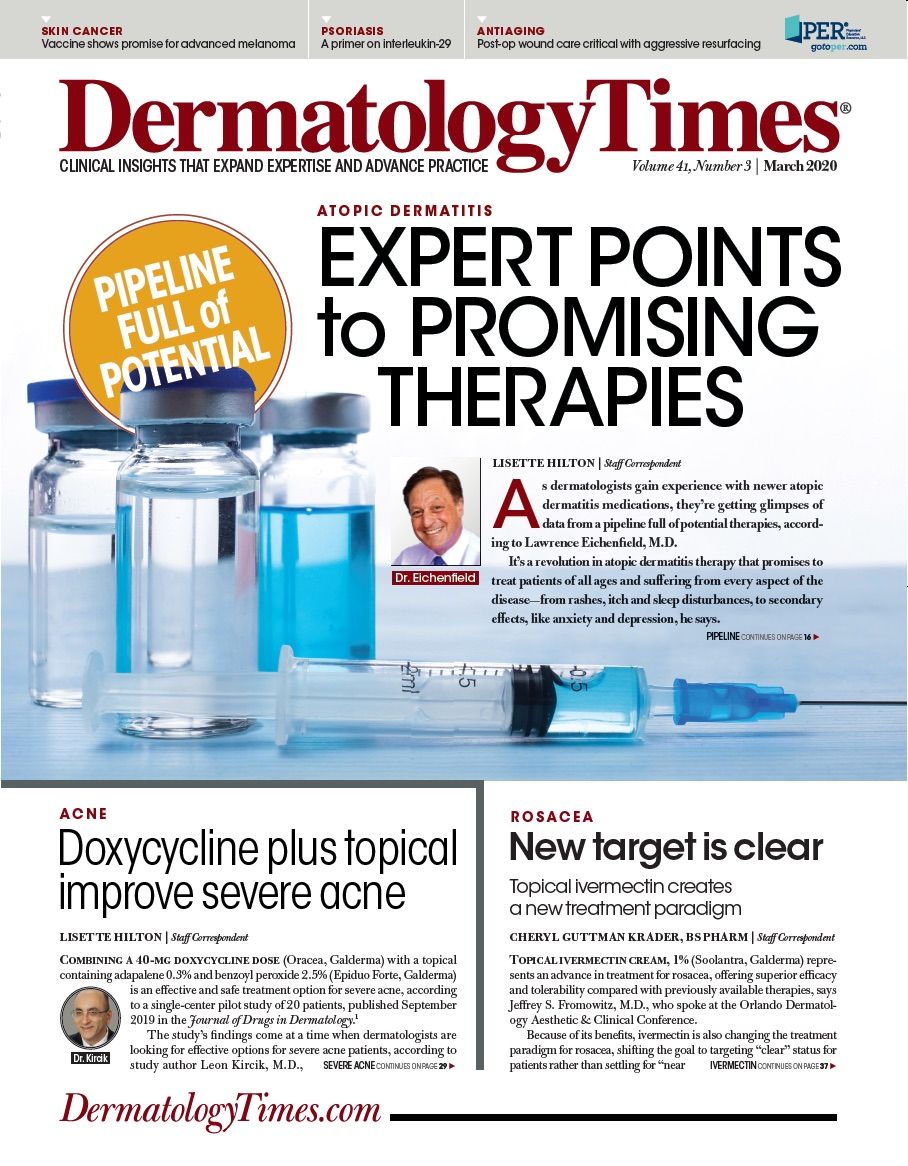- Case-Based Roundtable
- General Dermatology
- Eczema
- Chronic Hand Eczema
- Alopecia
- Aesthetics
- Vitiligo
- COVID-19
- Actinic Keratosis
- Precision Medicine and Biologics
- Rare Disease
- Wound Care
- Rosacea
- Psoriasis
- Psoriatic Arthritis
- Atopic Dermatitis
- Melasma
- NP and PA
- Skin Cancer
- Hidradenitis Suppurativa
- Drug Watch
- Pigmentary Disorders
- Acne
- Pediatric Dermatology
- Practice Management
- Prurigo Nodularis
- Buy-and-Bill
Publication
Article
Dermatology Times
Pharma excellence equals practice excellence
Author(s):
Dermatologists should engage in collaborative efforts to guide pharmaceutical companies as they develop drugs needed for the continued excellence of the specialty.
Zoe Diana Draelos, M.D.

One of the hardest things I ever say to a patient is: “I am sorry, but there is no treatment for your condition.”
In this world of scientific dominance, it is hard for the patient to imagine that there are no options - or that all possible options have been exhausted without success. Failure as a physician is difficult. I want to run and knock on the door of the nearest pharmaceutical company and tell them that I have a patient who I need to help!
READ MORE: Dr. Draelos discusses what's new in skincare
“Could you develop something that would make me a better physician in the eyes of my patient?” I’d ask.
“Could you do it quickly? Because my patient is in pain with accompanying emotional distress. This situation is very important to both my patient and me! Please do something!”
I find it a sobering thought that I could do little as a dermatologist without prescription medications. I rely on excellent pharmaceuticals to provide excellent results that will, in turn, allow my patient to see that I really am an excellent dermatologist. There is no doubt that I am dependent on innovation in the pharmaceutical industry to advance my ability to treat patients. However, the innovation in dermatology is now coming through other areas of medicine laterally.
For example, many biologics were originally developed for rheumatology and introduced for psoriasis indications. These same biologics are being tested for other dermatology indications, like atopic dermatitis and hidrandenitis suppurativa. This type of drug development still results in excellent dermatologic treatments, but we need to encourage primary pharmaceutical interest in dermatologic indications.
It has been discouraging to see a number of exciting dermatology start-ups disappear following financial problems or failed phase 3 studies.
READ MORE: Dr. Draelos highlights cosmetic technology advances
Topical dermatology drug development faces higher hurdles than any other area of medicine. Oral medications are much easier to develop because a true pill placebo can be developed. In topical drug development, there is no true placebo thus our studies are vehicle-controlled instead of placebo-controlled.
In many cases, the vehicle functions as a less effective active, raising the bar to demonstrate statistical superiority for the vehicle/active over the vehicle alone. This encourages drug formulators to make less-desirable vehicles to minimize the vehicle effect; however, topical drugs would be much more aesthetically pleasing, tactilely elegant and efficacious if this were a nonissue.
Topical drug development is a hurdle for many pharmaceutical companies, requiring the encouragement and support of dermatologists.
It is sad that we are currently experiencing a proliferation of new generics in dermatology instead of new innovator drugs. The price of topical dermatologics has skyrocketed. A topical brand acne antibiotic sold for $25 a bottle during my residency and now the generic bottle sells for $400. Indeed, there has been some inflation, but the efficacy of the medication is unchanged.
Many existing and new generic companies are examining the profit margin now possible on topical drugs and entering dermatology. While interest in dermatology is positive, innovator drugs are critical to the advancement of our specialty. I recently had a conversation with the head of research and development for a generic dermatology company. He had been in his position for 25 years and noted that there had been a steady stream of innovator topicals in dermatology for generic development, but this had now changed. He was not sure where his next generic was coming from and had even considered attempting to encourage his company to become a drug innovator!
I do remember 25 years ago attending the winter American Academy of Dermatology meeting with three to four new product launches annually. There was tremendous proliferation in new corticosteroid molecules of varying potency with many different vehicles to choose from, allowing customization for body area.
READ MORE: OTC options can provide prescription alternatives, says Dr. Draelos
Now, I am forced to use the first-line covered formulary corticosteroid for all indications and body areas. I feel like printing prescription pads with the three basic formulary-approved, low copay drugs that I am able to use and simply circling the one the patient is to receive.
Topical innovation is still occurring with the promise of new topical JAK inhibitors, which would be similar to the development of topical corticosteroids in terms of advancing dermatology. Inflammation reduction without skin atrophy! However, this type of innovation in topicals needs to be encouraged.
I hope this editorial is a call to action for dermatologists to be supportive of efforts by pharmaceutical companies on our behalf. This relationship has become strained in recent years by governmental regulation, corporate scandals and rising pharmaceutical prices.
The fact remains, however, that we are dependent on better drugs to be better dermatologists. We should be willing to help identify unmet medical needs, areas of opportunity and promising technologies. We should also offer our opinions and input on formulation and efficacy. Only through collaborative efforts can we guide the development of drugs needed for excellence in our specialty.







